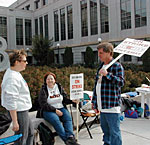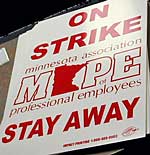Strikers say health benefits are main issue in strike
By Laura McCallum
Minnesota Public Radio
October 2, 2001
|
| RealAudio |
| |
|
|
|
||
Members of the Minnesota Association of Professional Employees and the American Federation of State, County and Municipal Employees Council 6 say they're prepared to walk the picket line as long as it takes to get a better contract offer from the state.
Lana Kane, who works in the Revenue Department mailroom, says only one person from her department has crossed the picket line. "Some people haven't a clue. They want the same things we do, but they just say they can't do without the money. But money isn't the issue, it's the health insurance," Kane said.
Agreeing with Kane is Jim Wyatt, a tax collector who's worked for the state for 16 years. He says he'd take a pay cut under the state's latest offer because of the health insurance increases. "I couldn't afford that," he says. "I've got three kids and my own family. If I had to pay what they want, it would put me into the hole."
State officials say the state's health insurance costs rose 20 percent in each of the last two years, and the state has to pass some of those costs onto employees.
| |
|
|
|
||
Administration Commissioner David Fisher says while state government is doing its job without the striking workers, their absence is having an effect. "We certainly see impacts in the adminstrative and paperwork, the back-room type of things that have to be done by all state agencies, including computer usage, computer services, paperwork that has to be pushed around."
Fisher says the state is doing more business online. Tab renewals over the Internet are up, and the state's NorthStar Web site received a record 1 million hits on the first day of the strike.
Fisher says there are no reports of problems on the picket line, although the Department of Employee Relations has received e-mails and calls from employees who want to return to work but are being pressured by co-workers not to cross the picket line.
Both sides say they're prepared for a month-long strike, and there are no signs of movement at this point. State mediator Lance Teachworth says he's been talking to both sides, but won't call them back to the bargaining table until he sees some reason to do so. He says both sides are basically where they were when talks broke down over the weekend.


